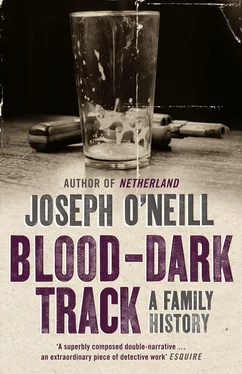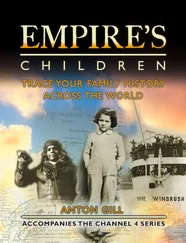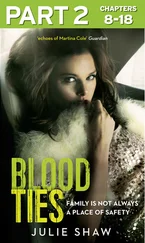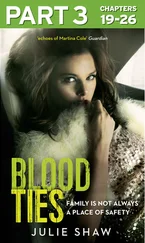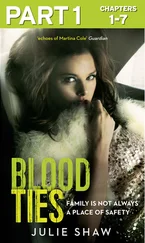But I didn’t know this for a fact. Actually, I knew just about nothing for a fact – nothing about these men, and very little about the historical circumstances of their lives.
Some might consider ignorance a virtuous trait in an inquirer, a clean slate on which evidence may impartially be inscribed. But it doesn’t work like that, at least it did not in my case. I was, of course, prejudiced; and, like most prejudices, mine found an infantile manifestation. It was not simply that my grandfathers stood accused in my mind of offences that I had not even formulated: it was that I didn’t like their faces. I didn’t like Jim’s face – there was something frightening about his handsome, tooth-baring smile – and I didn’t like the face of Joseph either, in particular the black moustache that made me think of Adolf Hitler.
What had they done wrong, though? Was it connected to their imprisonment? What were the facts?
It so happens that I am, by my professional training, supposed to be equipped as anybody to answer these sorts of questions and set to one side the kind of prejudice I have mentioned. I am a lawyer; more precisely, since lawyers are varietal as butterflies, I am a barrister working mainly in business law. It is a charmless but profitable field. There are countless commercial transactions effected every day, and they give rise to countless disputes. Were the goods defective? Did the surveyor give the bank negligent advice as to the value of a property development? Was there a material non-disclosure entitling the insurer to avoid the policy? For much of my working life I have gone into my chambers, pulled out ring binders from my shelves and tried to get to the bottom of these sorts of hard-boiled questions. After I have gone through hundreds of pages of correspondence, pleadings, affidavits and attendance notes, and sifted the relevant from the discardable, there are further, more finicky sub-questions. What was said in the telephone conversation of 14 February 1998? When did the cracks first appear in the wall? Who is Mr MacDougal? Often, meetings with the client are required to fill in the gaps or to quiz him closely to make sure nothing of significance has been left out. What one learns, pretty quickly, is that frequently the truth remains anybody’s guess – even after all the documents have been scrutinized, all the witnesses have been grilled, and all the solicitors, juniors, silks and experts, racking up fees of hundreds of thousands of pounds, have trained their searchlights into the factual darkness.
Sometimes, however, something is illumined that is strange and unlooked-for and that, although perhaps not decisive of the hard-boiled question, twists the case and gives it a new meaning. This is, in a sense, what transpired after I began to look into the unknown lives of Joseph and Jim, following the narrow beam of their coincidental imprisonment. It led to times and places in which politics might have dramatic and personal consequences; in which people might be impelled to act or acquiesce in the face of evil and embark on journeys of the body and spirit that to many of us, living in the democratic west at the beginning of the new century, may seem fantastical; and in which people might through political action or inaction discover boundaries in themselves – good and bad – that we, casting our vote twice a decade, or losing our temper at the dinner table, or shunning the wines and cheeses of France, maybe cannot hope to know. Maybe. It may be, in fact, that our lives are thrown into greater ethical relief than we suspect. We may be judged strenuously by our descendants, who will perceive distinct rights and wrongs, shadows and crests, that we failed to notice. In part, my grandfathers’ predicaments stemmed from what they saw or did not see around them. To this extent, they stand as paradigms of political and moral visions of different sorts, the blind eye and the dazzled eye, each with its own compensations and each with its own price.
Конец ознакомительного фрагмента.
Текст предоставлен ООО «ЛитРес».
Прочитайте эту книгу целиком, купив полную легальную версию на ЛитРес.
Безопасно оплатить книгу можно банковской картой Visa, MasterCard, Maestro, со счета мобильного телефона, с платежного терминала, в салоне МТС или Связной, через PayPal, WebMoney, Яндекс.Деньги, QIWI Кошелек, бонусными картами или другим удобным Вам способом.
